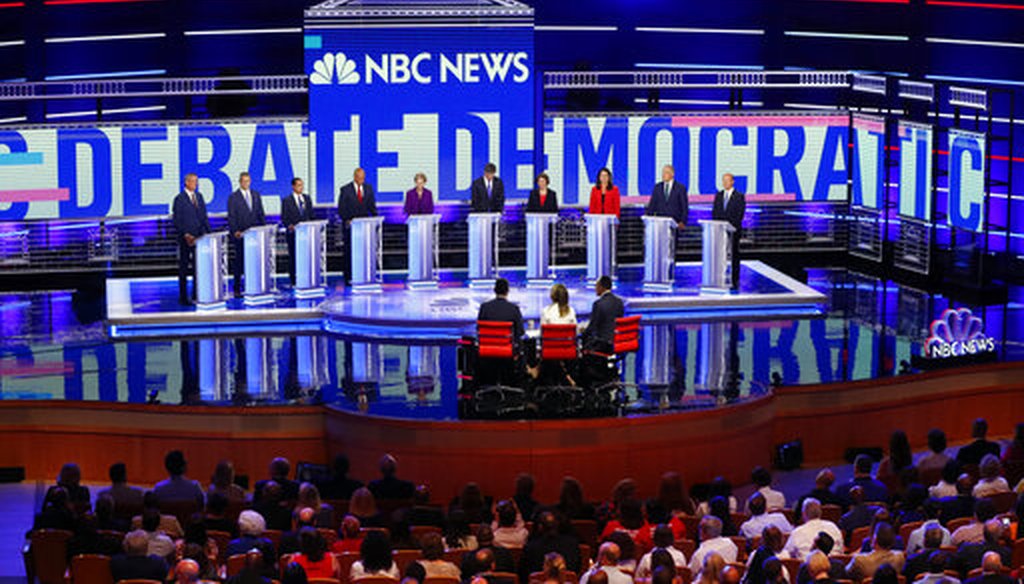Stand up for the facts!
Our only agenda is to publish the truth so you can be an informed participant in democracy.
We need your help.
I would like to contribute

Democratic presidential candidates before the start of a Democratic primary debate Wednesday, June 26, 2019, in Miami (AP).
This story was updated with additional coverage on June 27 at 8 p.m.
The Democrats who want to challenge Donald Trump for the presidency took the stage for the first debate of the presidential primary of the 2020 election cycle. Many of them argued that the U.S. economy isn’t working for working people.
The Democratic field is so large that only half the candidates appeared Wednesday; another debate with the rest of the field was scheduled for the next night.
Here are some of the candidates’ comments, with fact-checking or additional context.
This statement is not accurate and lacks evidence. It rates False.
Delaney has not gone "to every hospital in the country," and no researcher has done this, either. More to the point, experts told us that the potential impact of paying hospitals Medicare rates would be nuanced — it is not at all clear that "every single hospital" would close, and while some would do worse, some might do better.
Delaney’s claim misses another point. The Medicare for All bill sponsored by fellow Democratic candidate Sen. Bernie Sanders doesn’t actually say hospitals would be paid Medicare rates. The current Medicare for All bill in Congress delegates to the federal government the task of setting up a payment schedule for hospitals and doctors.
Analysts noted that Delaney is getting at something real, and important. Medicare for All would represent a seismic change for hospitals. Figuring out how to pay them would be complicated. But Delaney's sweeping statement goes too far.
— Shefali Luthra, Kaiser Health News
We can’t know for certain whether Martínez Ramírez heard about metering or any other policies, so we aren’t rating Castro’s statement on the Truth-O-Meter. But it doesn’t seem far-fetched: Metering may lead migrants to cross the border illegally, according to experts and government investigators.
U.S. Customs and Border Protection uses "metering" as a way to manage the flow of people seeking entry at official ports of entry — capping the daily number of asylum applications received at official border crossings.
"It creates a huge incentive for migrants to cross the border between ports of entry in an unauthorized manner, step on U.S. soil, and then make what is known as a ‘defensive’ asylum claim," said Christopher Wilson, deputy director of the Mexico Institute at the Wilson Center. Read our related story on metering and its effects.
This is a flawed comparison. Booker said administrative overhead eats up much more for private carriers than it does for Medicare, the government insurance program for seniors and the disabled. But Medicare piggybacks off the Social Security Administration, which covers costs of enrollment, payments and keeping track of patients.
Also, Medicare relies on private providers for some of its programs, and overhead charges there are higher. Medicare’s overhead is less than that of private carriers, but exact figures are elusive.
The Association of Heath Care Plans, the insurance company trade group, reported in 2018 that 18.1% of private health care premiums went to non-health care services. That includes taxes of 4.7% and profits of 2.3%. The Medicare trustees reported that in 2018, total expenses were $740.6 billion, with administrative expenses of $9.9 billion. That comes to 1.3%, less than Booker said.
— Jon Greenberg
Klobuchar said "debt," but the projected savings on the 2013 immigration bill had to do with the deficit. We rated a similar statement Half True.
Klobuchar was referring to a bill written by a group of bipartisan senators known as the "Gang of Eight." The bill, which passed the Senate and never reached a vote in the House, would have given many undocumented immigrants a path to citizenship, expanded other forms of legal immigration and provided a large increase in border security.
When we fact-checked a similar statement Klobuchar made in February, we found that she was on point to state that the federal government found a net positive for the federal budget. But the bill would have reduced future net federal spending; it would not have reduced actual debt.
The Congressional Budget Office said the bill would, on net, shrink federal budget deficits by $158 billion between 2014 and 2023. But the debt would have still gone up, just at a slower rate than it would have otherwise.
— Amy Sherman
Is the No. 1 reason people go broke the cost of health care? We’ve rated similar statements Half True — partially accurate but lacking important context.
A 2005 study Warren co-authored and a 2009 paper both found that health care expenses were a leading cause of personal bankruptcy. But these claims have come under dispute, in particular from academics who suggest that people may overstate the role medical bills play in their financial problems. Other research suggests a far narrower impact, though that in turn has been criticized for focusing only on adult hospitalizations.
That said, research from the Consumer Finance Protection Bureau found that medical bills are a leading cause of personal debt — in 2014, the CFPB found that nearly 20% of credit reports included a medical debt tradeline.
— Shefali Luthra, Kaiser Health News
O’Rourke’s claim about the OxyContin manufacturer is misleading. It’s true that no executives with the pharmaceutical giant have served jail time in connection to the opioid crisis, but it’s a stretch to suggest the firm has acted with "complete impunity" and without consequences.
In March, Purdue Pharma agreed to a $270 million settlement to the state of Oklahoma and Oklahoma State University, after the state’s attorney general accused the manufacturer of overstating the efficacy of its pain medication while "falsely downplaying the risk of addition to those medications."
The company has paid other hefty fines in the past. In 2007, the holding company affiliated with Purdue Pharma and three executives at the firm pleaded guilty to charges of misbranding OxyContin and agreed to collectively pay more than $634.5 million in fines — one of the "largest amounts ever paid by a drug company in such a case" at the time, according to the New York Times.
This came after Purdue Pharma, the manufacturer, agreed to pay $19.5 million in a settlement agreement with 26 states and the District of Columbia "over allegations it failed to adequately disclose abuse risks posed by the powerful narcotic," according to Reuters.
In 2004, Purdue Pharma reached a $10 million settlement with West Virginia over claims that the manufacturer had inappropriately marketed OxyContin to residents of the state.
— Madlin Mekelburg
Booker certainly has a point that African Americans are disproportionately represented in the criminal justice system, but in his effort to make this eye-catching comparison in the debate, he muffed it. He didn’t specify African American men, so his statement is not accurate.
In a Washington Post op-ed published March 10, Booker wrote, "Stunningly, there are now more African American men under criminal supervision than there were slaves in 1850."
Looking just at men in an earlier fact-check, we found that there were 872,924 male African American slaves over age 15, compared with about 1.68 million African American men under state and federal criminal justice supervision in 2013.
But if you ignore gender, as Booker did in the debate, the number of men, women and children in slavery in 1850 was 3.2 million. And since men (of any race) make up the lion’s share of individuals in prison or under criminal justice supervision, adding women to the total doesn’t increase the number of criminally supervised near as much.
— Louis Jacobson
De Blasio said he gave New Yorkers universal health care. That rates Mostly False.
De Blasio unveiled a plan in January that includes a new program that aims to give anyone (who has lived in New York City for at least six months) access to New York’s renowned public health system at a price tailored to their financial situation. But for the most part, de Blasio did not create a new system so much as make sure New Yorkers can use the one they have — and it remains to be seen how well his methods will work.
The plan is expected to be rolled out over time, beginning with the Bronx and encompassing all five boroughs by the end of 2020. (It was originally slated to be "fully available" in 2021, but by the time de Blasio announced his presidential run in mid-May, that date had been moved up.)
— Emmarie Huetteman, Kaiser Health News
This is accurate, per a report from Pharmacy Benefits Consultants, an industry group, which listed a number of pharmaceutical products experiencing price increases as high as 1,467.73%.
And the numbers are even less flattering than Klobuchar would suggest.
An analysis by the Associated Press found that, between January and July 2018, more than 4,400 branded prescription drugs experienced price increases. Meanwhile, data compiled by Rx Savings Solutions found that the list price of more than 3,000 drugs went up this year.
— Shefali Luthra, Kaiser Health News
The statistic Booker talked about related to skipping school for at least a day.
It comes from the National School Climate Survey by GLSEN, a national gay and lesbian youth advocacy organization. GLSEN has surveyed youth every two years since 1999.
The survey, conducted online between April and August 2017, consisted of about 23,000 students between the ages of 13 and 21 in all 50 states. The survey documents experiences of harassment and assault as well as school policies and explores the effects of a hostile school climate on educational outcomes and well-being.
"Schools nationwide are hostile environments for a distressing number of LGBTQ students, the overwhelming majority of whom routinely hear anti-LGBTQ language and experience victimization and discrimination at school," the report stated. "As a result, many LGBTQ students avoid school activities or miss school entirely."
The survey found that "34.8% of LGBTQ students missed at least one entire day of school in the past month because they felt unsafe or uncomfortable, 10.5% missed four or more days in the past month."
The survey found that 18% of LGBTQ youth left their school altogether due to a hostile environment.
— Amy Sherman
We contacted Warren’s campaign, who directed us to a report from the National Association of Insurance Commissioners, a non-partisan group of industry regulators. It supports her assessment.
The report says that in 2018, health insurers posted $23.4 billion in net earnings, or profits, compared with $16.1 billion a year prior.
This came up in the context of Warren’s support for eliminating private insurance under a Medicare for All system. However, the financing and price tag of such a system is unclear.
— Shefali Luthra, Kaiser Health News
This is largely accurate.
In 2018, the nonpartisan Congressional Budget Office increased its estimate of how much the December 2017 tax bill cost, from about $1.5 trillion to $1.9 trillion.
The tax bill did lower the corporate tax rate at a time when Federal Reserve data showed a record of nearly $2.3 trillion in non-financial companies’ liquid assets in the second quarter of 2017.
As for the tax bill tilting toward the wealthy, the Urban Institute-Brookings Institution Tax Policy Center estimated that in 2027, the top 1 percent will receive 83 percent of the benefits of the law. That number, according to the center’s analysis, would be smaller early on. Through 2025, the top 1 percent would get 20 percent to 25 percent of the benefits. But even that share suggests a tilt towards wealthier taxpayers.
On the question of "historic wealth inequality," most measures do show a high degree of income inequality in the United States in recent years. In 2016, the GINI coefficient — a measure of how unequal the income distribution is — hit a high going at least as far back as 1979. And another study of income inequality, by the World Inequality Database, found that the percentage of income taken by the top 1% rose from 10.7% in 1980 to 20.2% in 2014.
— Louis Jacobson
This is largely correct.
After decades of skirmishing over capping regular workdays at eight hours, "demands for the five-day week began to proliferate in 1919, a year in which 4 million American workers went out on strike," Priscilla Murolo, a professor of history at Sarah Lawrence College, told PolitiFact in 2015. "That was about 20 percent of the industrial labor force."
It took President Franklin D. Roosevelt’s signing of the Fair Labor Standards Act in 1938 for all workers to see limits on working hours — initially 44 hours a week, then phased to 42 and eventually 40 by 1940. When the law was passed in 1938, Saturday working hours were still common, another labor relations expert told us.
Matt Anderson, curator of transportation at The Henry Ford Museum in Dearborn, Mich., said that while Ford — the founder of the Ford Motor Co. — was an early proponent of the five-day week, "the American Federation of Labor fought for it to be adopted more widely via contract negotiations," Anderson said. "Unions absolutely deserve much credit for the reform."
— Louis Jacobson
This is pretty much on the money.
Venture capitalists invest in a relative handful of metro areas. A 2017 study found that "the top five metros — San Francisco, San Jose, New York, Boston and LA — account for more than 70 percent of venture capital investment across the United States."
Add in San Diego, Seattle-Tacoma, Miami-Fort Lauderdale, Chicago, Washington and Austin, and you get over the 80% mark. It’s not exactly a tally by county, but it’s pretty close. And it fits the pattern of three states — California, New York and Massachusetts — dominating the venture capital market, according to the National Venture Capital Association.
— Jon Greenberg
Our Sources
See links for sources.





































